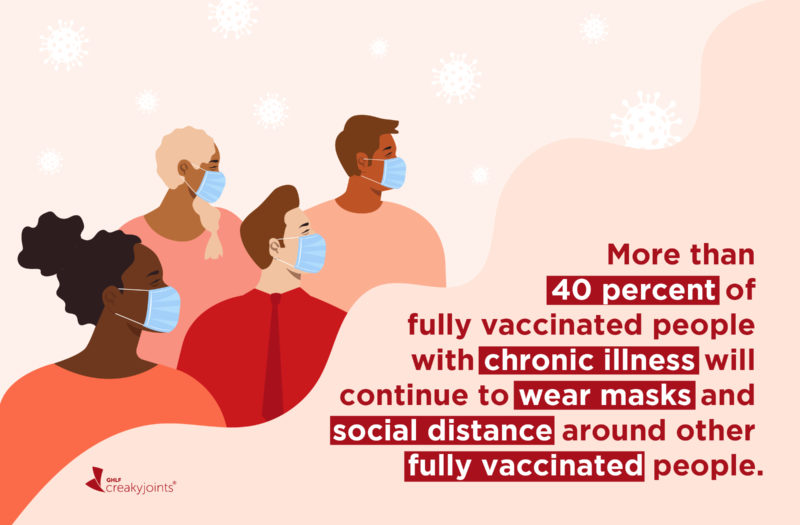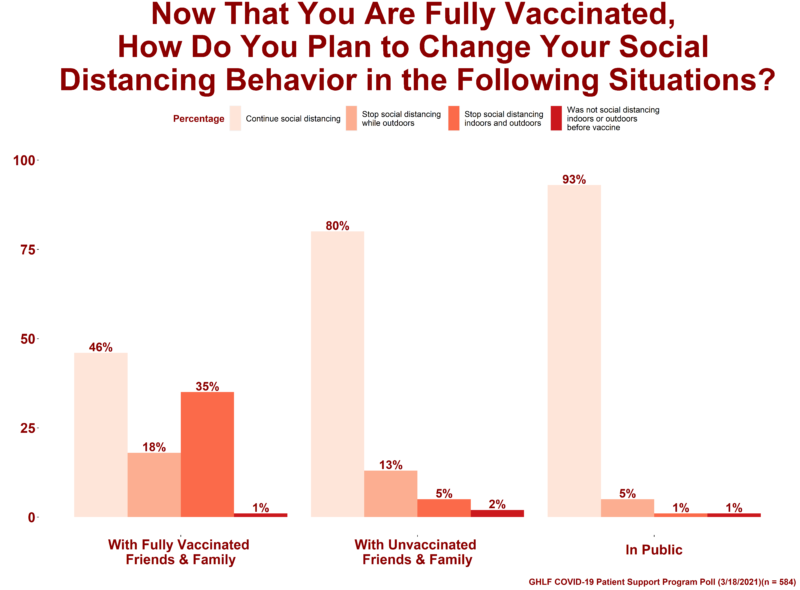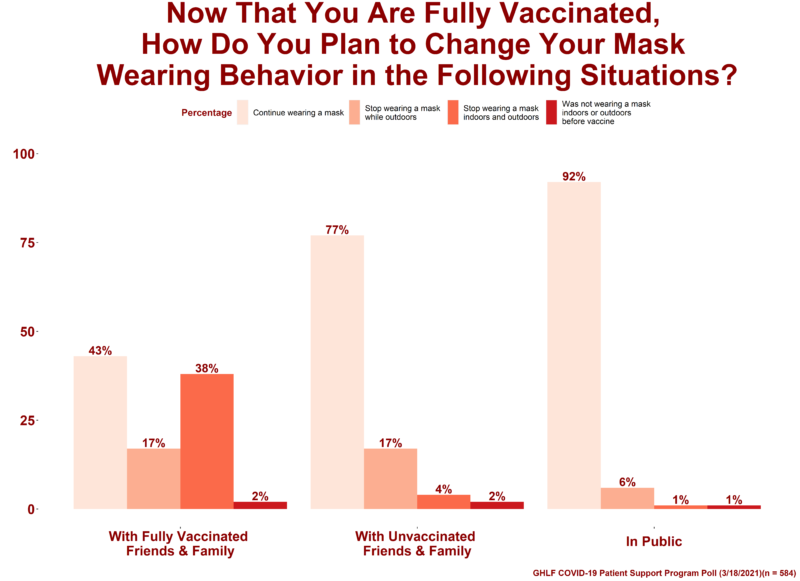Learn more about our FREE COVID-19 Patient Support Program for chronic illness patients and their loved ones.
Earlier this month, the U.S. Centers for Disease Control and Prevention (CDC) released new recommendations outlining what fully vaccinated people can feel comfortable doing during the COVID-19 pandemic.
Although it is still encouraged to social distance and wear face masks when in public and when with people who are or live with someone who is at increased risk for severe COVID-19, the new recommendations say fully vaccinated people can:
- Visit with other fully vaccinated people indoors without wearing masks or physical distancing
- Visit with unvaccinated people from a single household who are at low risk for severe COVID-19 disease indoors without wearing masks or physical distancing
- Refrain from quarantine and testing after a known coronavirus exposure if asymptomatic
The suggestions, however, are not one-size-fits-all. For example, the CDC said specifically that “people should discuss with their provider if they have any questions about their individual situation, such as immunocompromising conditions or other concerns.”
It is not yet clear whether or to what degree people who take immunosuppressive medication (as do many people with autoimmune and inflammatory conditions) have a decreased response to the COVID-19 vaccine. For this reason, several experts told CreakyJoints that fully vaccinated people who are immunocompromised should continue following current public health advice for mitigating COVID-19.
“I would say if someone is immunocompromised and vaccinated, that they should still take precautions like wearing a mask and abiding by the six-foot social distancing recommendations, even if they’re around vaccinated people,” says David Aronoff, MD, Director of the Division of Infectious Diseases at Vanderbilt University School of Medicine in Nashville, Tennessee.
And many people with chronic illnesses plan to do just that — even when they’re with other fully vaccinated people.
In a recent poll of 1,985 people conducted by the Global Healthy Living Foundation (GHLF) of its COVID-19 Patient Support Program, 584 patients — about 30 percent — reported being fully vaccinated at the time of the survey. The poll, which was conducted March 18-21, 2021, aimed to gain insight into whether chronic illness patients would change their behaviors after being fully vaccinated.
Being fully vaccinated means that it has been two or more weeks since getting the final dose of a two-dose vaccine (Pfizer or Moderna) or two or more weeks after receiving a single-dose vaccine (Johnson & Johnson).
Some 25 percent of poll respondents have not received any vaccine doses. The remaining 45 percent either received just one dose or have not yet hit the two-week window after their final vaccine dose.
Of the fully vaccinated respondents, 46 percent said they will continue to social distance around fully vaccinated friends and family members. The results for wearing a mask were similar: 43 percent said they will keep wearing a face mask around fully vaccinated loved ones.
Here are more insights from the survey data.
Though fully vaccinated people feel more comfortable around other fully vaccinated family and friends, many continue to exercise caution.
Among those who are fully vaccinated, more people reported being likely to stop social distancing and wearing face masks when they were with other fully vaccinated people than when with unvaccinated loved ones or in public.
Social Distancing
When fully vaccinated patients were asked about social distancing around fully vaccinated loved ones:
- 46% said they will continue their social distancing habits
- 18% said they will stop social distancing while outdoors
- 35% said they will stop social distancing indoors and outdoors
- 1% of people said they will not change, as they were not social distancing before their vaccination
But when fully vaccinated patients were asked about social distancing around unvaccinated loved ones:
- 80% said they will continue their social distancing habits
- 13% said they will stop social distancing while outdoors
- 5% said they will stop social distancing indoors and outdoors
- 2% said they will not change, as they were not social distancing before their vaccination
Face Masks
The results were similar when it came to wearing a face mask.
When fully vaccinated patients were asked about wearing masks around fully vaccinated loved ones:
- 43% said they will continue wearing masks
- 17% said they will stop wearing masks while outdoors
- 38% said they will stop wearing masks indoors and outdoors
- 2% said they will not change, as they were not wearing masks before their vaccination
When fully vaccinated patients were asked about wearing masks around unvaccinated loved ones:
- 77% said they will continue wearing masks
- 17% said they will stop wearing masks while outdoors
- 4% said they will stop wearing masks indoors and outdoors
- 2% said they will not change, as they were not wearing masks before their vaccination
People who are not fully vaccinated are becoming more comfortable being with loved ones who are fully vaccinated.
Among the 1,401 respondents who are not yet fully vaccinated, 67 percent said they feel more comfortable spending time with family and friends who are fully vaccinated.
This sentiment is in line with recommendations from the American College of Rheumatology’s recent COVID-19 vaccine guidance, which recommends that “household members and other frequent, close contacts of [inflammatory and autoimmune] patients should undergo COVID-19 vaccination when available to them to facilitate a ‘cocooning effect’” for better protection of immunocompromised patients.
Of course, it’s important to continue to take precautions and avoid high-risk situations, but it is promising that as more people continue to get vaccinated, high-risk and immunocompromised patients may feel safer starting to engage in social interactions that can help fend off loneliness and improve mental health.
Many respondents who are not fully vaccinated have concerns about spending time in public places even as more people get vaccinated.
Among those who are not fully vaccinated, 43 percent said the fact that more people in general are getting vaccinated makes them feel more comfortable being in public. However, most (57 percent) of respondents said they do not feel more comfortable being in public even as more people around them get vaccinated.
We know from previous research that many people in the GHLF patient community have been trying to stay home as much as possible and minimize their exposure to COVID-19 throughout the pandemic. This has included getting groceries and other essential items delivered, forgoing haircuts, not eating at restaurants, and minimizing errands and shopping except for essential items.
This is understandably an exhausting and isolating lifestyle to maintain over such a long period of time. It helps demonstrate why it’s important for people with chronic illnesses to get vaccinated as soon as they’re able, which should help those in our community start to feel more comfortable easing back into everyday activities over time.
An Overall Theme: Proceeding with Caution
More than 1,200 respondents filled in the free-response section of the poll, in which they could share general thoughts about the new recommendations for fully vaccinated people. A common theme that emerged was practicing caution, rather than throwing it to the wind.
Caution Because of Variants
Many patients said other variants of the virus — and the lack of information about them — were one of the reasons they would still practice caution.
“Until we know how the vaccine works with the variants of the virus, I appreciate the recommendation to remain masked and distant,” one respondent wrote. Another said that they were worried afraid that “a new variant will pop up that the current vaccines don’t cover” and that people “do not respect my hesitation to be mask-less in group settings.”
Caution Because of Lack of Information Pertaining to Immunocompromised People
Another common response was about not having enough information about how the coronavirus and COVID-19 vaccine affect immunocompromised people.
“I am very disappointed to learn that, as an immunocompromised person, who is fully vaccinated, the new CDC guidelines don’t apply to me, and I won’t know for some time how protected I am or if I can spread the disease,” one person wrote. “I hope there is some good news soon for people like me because I find this very depressing.
Similarly, another person said, “until there is more data available about the immunogenicity [immune response] in immunocompromised or people with chronic health conditions who have received the vaccine, how the vaccine does with virus mutations, we should adhere to the same strict guidelines as before. I think it is foolish to let our guards down too soon.”
“I feel as if immunocompromised people are being forgotten,” another respondent wrote. “Although I am happy and so relieved for my family, friends, and all fully vaccinated people, it is very difficult to not have that relief for myself. I am tired of being forgotten and judged as unimportant, as are so many other people in our world.”
Caution Because of a Lack of Trust in Other People and Their Own Bodies
For many respondents, it’s all a matter of trust — or rather, a lack of it.
“I live in a state that hasn’t taken COVID seriously, so I don’t have much public trust,” one person wrote.
Similarly, another person wrote that they, “don’t trust people who may say they are vaccinated when they in fact are not and don’t intend to be.”
But it isn’t just a lack of trust isn’t limited to strangers in the community. Several respondents said they “don’t trust certain friends and family members to tell the truth.”
One person shared this perspective: “I don’t trust my body. I really don’t know how many antibodies my body built or if I have enough protection.”
For more information about on staying safe after you’re fully vaccinated, check out our guide: What Immunocompromised People Should Know About the CDC Recommendations for Fully Vaccinated People.
The Global Healthy Living Foundation is committed to providing ongoing education about COVID-19 vaccines for the chronic illness and immunocompromised community.
To stay informed about the latest COVID-19 vaccine news for people who are immunocompromised, take immunosuppressant medications, or have autoimmune conditions, follow all of our COVID-19 vaccine coverage here.
Get Free Coronavirus Support for Chronic Illness Patients
Join the Global Healthy Living Foundation’s free COVID-19 Support Program for chronic illness patients and their families. We will be providing updated information, community support, and other resources tailored specifically to your health and safety.
About the Patient Support Program Quick Poll
Members of our program have underlying health issues — such as inflammatory arthritis and other autoimmune conditions, heart disease, lung disease, diabetes, and more — that may increase their risk for COVID-19 complications. They are interested in understanding the best ways to stay safe during the pandemic and to be part of a community of people with similar concerns, questions, and fears.
We regularly poll members, who live in the U.S. as well as around the globe, about a variety of topics, including how the pandemic is affecting their lifestyle, mental health, chronic disease management, medication adherence, and more.
We use this information to inform the educational resources we provide and to inform other stakeholders — such as public health experts, policymakers, advocacy groups, health care professionals, and pharmaceutical companies — about chronic illness patients’ needs and concerns. You can participate in ongoing polls by joining the support program here.
COVID-19 Vaccine Clinical Guidance Summary for Patients with Rheumatic and Musculoskeletal Diseases. American College of Rheumatology. March 4, 2021. https://www.rheumatology.org/Portals/0/Files/COVID-19-Vaccine-Clinical-Guidance-Rheumatic-Diseases-Summary.pdf.
Interim Public Health Recommendations for Fully Vaccinated People. COVID-19. U.S. Centers for Disease Control and Prevention. March 8, 2021. https://www.cdc.gov/coronavirus/2019-ncov/vaccines/fully-vaccinated-guidance.html.
Interview with David Aronoff, MD, Director of the Division of Infectious Diseases at Vanderbilt University School of Medicine in Nashville, Tennessee








